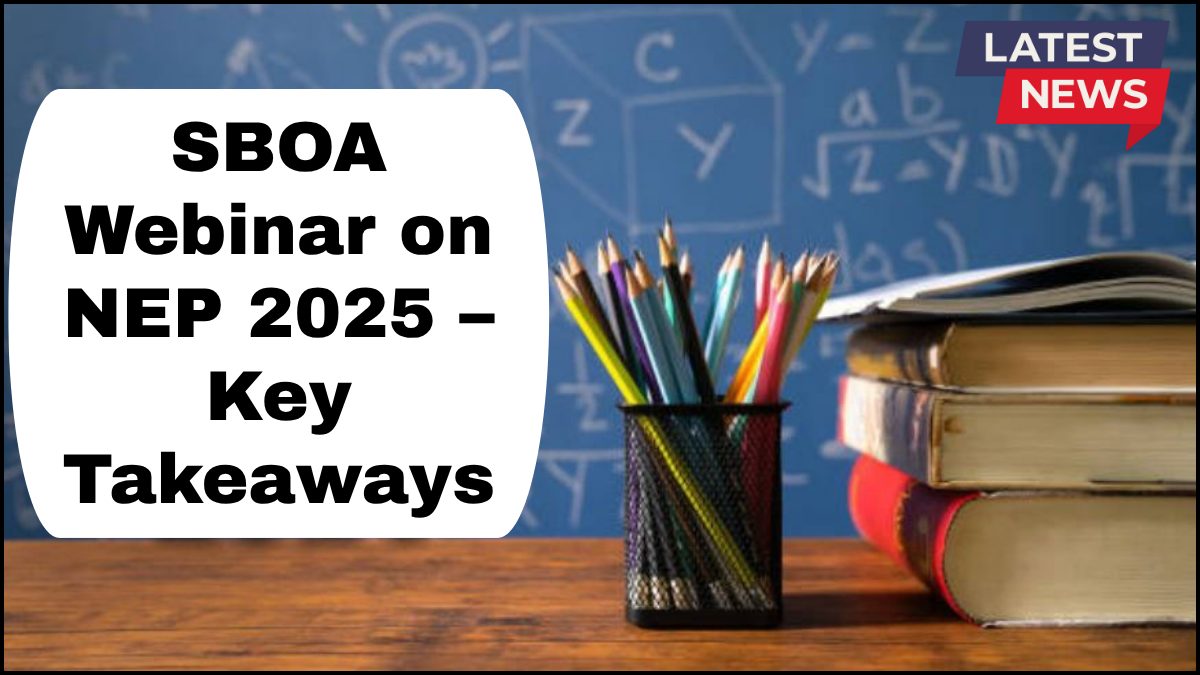The National Education Policy Webinar hosted by the State Bank Officers’ Association (SBOA) provided a comprehensive overview of the impending NEP 2025 reforms. This awareness session brought together educationists, policy experts, and school administrators to discuss the direction of India’s evolving education framework. With NEP 2025 set to redefine academic goals and pedagogical standards, the webinar offered valuable insights into the policy’s vision, implementation roadmap, and its impact across educational tiers.

Understanding NEP 2025: A Paradigm Shift in Indian Education
The NEP 2025 aims to build upon the foundation laid by NEP 2020, expanding its reach and impact. Unlike previous policies that largely focused on infrastructure and examination reforms, NEP 2025 places a greater emphasis on holistic development, inclusive education, and the integration of technology in learning.
The policy promotes a flexible, learner-centric approach that nurtures critical thinking, creativity, and ethical values from the early years through higher education. The National Education Policy Webinar made it clear that the shift is not just academic but cultural, reshaping how we perceive education’s role in society.
Key Highlights from the SBOA Webinar
1. Revised Curriculum Structure
One of the most significant changes emphasized was the transformation from the 10+2 structure to a 5+3+3+4 model, focusing on foundational, preparatory, middle, and secondary stages. The framework promotes experiential learning from an early age, reducing rote memorization and fostering real-world skills.
2. Multilingualism and Mother Tongue Instruction
Speakers highlighted the NEP 2025 mandate for multilingual education. Children will be taught in their mother tongue or regional language until at least Grade 5, making learning more accessible and effective. The policy supports linguistic diversity while aiming to boost comprehension and cognitive growth.
3. Integration of Technology in Classrooms
The webinar stressed the growing role of ed-tech platforms and digital infrastructure. From smart classrooms to AI-driven assessments, NEP 2025 envisions a digital-first ecosystem. Teachers will be trained to integrate technology meaningfully, not just as a tool but as a core part of pedagogy.
4. Teacher Training and Development
The awareness session underscored the importance of continuous teacher training. NEP 2025 mandates that all teachers undergo regular professional development, with competency-based evaluations. This ensures educators are equipped with the latest methodologies and content knowledge.
5. Vocational Education and Life Skills
A forward-thinking element of the policy is the integration of vocational training starting from Grade 6. Students will gain practical exposure through internships, workshops, and hands-on experiences. This aligns education with market realities and prepares students for a broad range of careers.
Role of Schools and Stakeholders
The National Education Policy Webinar emphasized the collaborative role of schools, parents, and communities. Institutions like SBOA schools are encouraged to become active agents of change, implementing NEP 2025’s vision through localized strategies and inclusive governance.
Furthermore, parents were advised to stay informed and participate actively in this educational transformation. From feedback mechanisms to School Management Committees, community engagement will be a pillar of the policy’s success.
Challenges and Opportunities
Despite its progressive agenda, NEP 2025 presents challenges—especially around infrastructure, teacher availability, and rural-urban parity. However, the SBOA awareness session highlighted that with phased implementation and robust monitoring, these obstacles can be addressed.
The policy also presents unprecedented opportunities for India to become a global knowledge hub, promoting cross-border academic collaboration and world-class research.
Conclusion
The SBOA Webinar on NEP 2025 served as an essential awareness session, preparing stakeholders for the upcoming transformation in Indian education. The policy is not just a reform—it’s a reimagination of how we educate, assess, and empower our learners. As schools, educators, and families align with NEP 2025’s goals, the future of Indian education looks more inclusive, dynamic, and future-ready.
FAQs
Q1: What is the main goal of NEP 2025?
A: NEP 2025 aims to create a holistic, flexible, and learner-centered education system that promotes critical thinking, skill development, and inclusivity from early childhood to higher education.
Q2: How does NEP 2025 differ from NEP 2020?
A: While NEP 2020 laid the groundwork, NEP 2025 goes further by introducing broader technological integration, structured vocational training from an early age, and a refined 5+3+3+4 curriculum model.
Q3: What was the purpose of the SBOA National Education Policy Webinar?
A: The webinar served as an awareness session to educate educators, parents, and policy implementers on the core elements, implementation strategies, and impact of NEP 2025.
Q4: How will teachers be supported under NEP 2025?
A: Teachers will receive continuous professional development, skill-based evaluations, and training in digital tools and new pedagogies to align with the policy’s goals.
Q5: How will NEP 2025 benefit students?
A: Students will experience more engaging, relevant, and personalized learning that includes life skills, digital literacy, and career-oriented exposure from a younger age.
click here to learn more